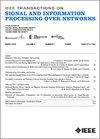Distributed $H_\infty$ Secure Fusion Estimation for Energy-Constrained Multi-Sensor Systems Under Hybrid Attacks
IF 3
3区 计算机科学
Q2 ENGINEERING, ELECTRICAL & ELECTRONIC
IEEE Transactions on Signal and Information Processing over Networks
Pub Date : 2025-08-04
DOI:10.1109/TSIPN.2025.3594164
引用次数: 0
Abstract
This paper investigates the distributed混合攻击下能量约束多传感器系统的分布式$H_\infty$安全融合估计
研究了能量受限多传感器系统在混合攻击下的分布式$H_{\infty }$安全融合估计问题。在能量有限的情况下,传感器节点有两种工作模式:高能量模式,保证了信息传输过程的安全性;低能量模式,使得信息传输更容易受到混合攻击。混合攻击是指在从传感器到局部估计器的通信通道中随机发生的虚假数据注入(FDI)和拒绝服务(DoS)攻击。为了应对这些挑战,我们提出了一种新的分布式$H_{\infty }$安全融合估计模型,专门针对混合攻击场景下能量受限的多传感器系统设计。推导了保证安全融合估计误差系统达到指数均方稳定性和$H_{\infty }$性能水平的充分条件。此外,还讨论了最优融合权矩阵的设计。最后,通过实例验证了所提出的分布式$H_{\infty }$安全融合估计方法的有效性。
本文章由计算机程序翻译,如有差异,请以英文原文为准。
求助全文
约1分钟内获得全文
求助全文
来源期刊

IEEE Transactions on Signal and Information Processing over Networks
Computer Science-Computer Networks and Communications
CiteScore
5.80
自引率
12.50%
发文量
56
期刊介绍:
The IEEE Transactions on Signal and Information Processing over Networks publishes high-quality papers that extend the classical notions of processing of signals defined over vector spaces (e.g. time and space) to processing of signals and information (data) defined over networks, potentially dynamically varying. In signal processing over networks, the topology of the network may define structural relationships in the data, or may constrain processing of the data. Topics include distributed algorithms for filtering, detection, estimation, adaptation and learning, model selection, data fusion, and diffusion or evolution of information over such networks, and applications of distributed signal processing.
 求助内容:
求助内容: 应助结果提醒方式:
应助结果提醒方式:


